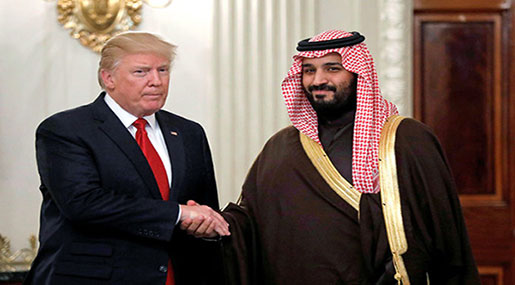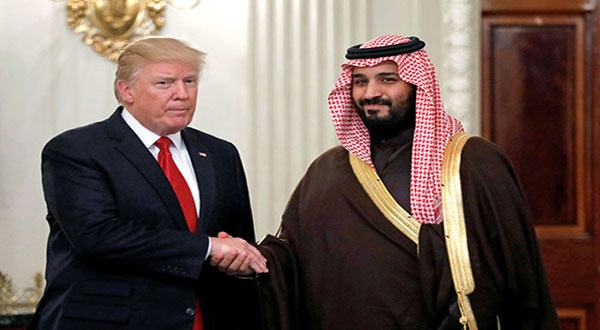
Trump’s Love-Fest with Saudi Arabia Carries Risks for the US

Roula Khalaf
Two months ago, in a conversation about Saudi Arabia, an Arab diplomat warned me of an "April Glaspie moment". Glaspie, you might recall, was the US ambassador to Iraq who told Saddam Hussein that Washington took no position on internal Arab affairs. This was interpreted by the Iraqi dictator as an amber light to invade Kuwait. Disaster followed: the US launched the first Gulf war to oust Saddam from Kuwait.

Saudi Arabia is not Saddam's Iraq. But the Arab diplomat's argument was that the love-fest between Donald Trump and the kingdom's leadership risked sending a wrong signal, emboldening Saudi Arabia and leading to consequences that run counter to US interests. In his mind, the Glaspie character was not an American diplomat. It was the American president himself.
Events of the past few weeks suggest he has a point. Soon after Trump left Saudi Arabia - the country he chose for his first foreign trip - Riyadh launched a campaign to isolate Qatar, its small mercurial neighbor.
Saudis and Qataris have rarely been on good terms but tensions have never escalated so destructively. Saudi Arabia, along with the United Arab Emirates, Egypt and Bahrain severed diplomatic ties and cut off air, sea and land links with Doha, claiming that it supports terrorism and was cozying up to their arch-rival Iran.
Trump has cheered the Saudis and joined in bashing Qatar, even though it hosts the biggest American military base in the region and its stability is paramount to the US. He's also ignored the advice of his state department, which declared itself earlier "mystified" that the Saudis and their partners have yet to issue a list of their grievances against Qatar.
By this week, Saudi Arabian boldness was on display again. King Salman cast aside his nephew and crown prince Mohammed bin Nayef and elevated his favorite son Mohammed bin Salman [known in foreign circles as MbS] to heir apparent. The most dramatic shake-up in the House of Saud in decades would have required at least a nod from the White House, the Saudis' biggest ally and protector. One can only assume that Trump obliged.
And yet, until recently, within the intelligence and ‘defense' community in Washington, Mohammed bin Nayef, credited with a successful campaign to root out al-Qaeda in the kingdom, was seen as the most reliable and level-headed Saudi prince. MbS was considered too young and impulsive.
But MbS has been courting the Trump administration. He was among the first Arab leaders to meet the US president. His government has lavished praise on Trump and pledged multi-billion dollar deals. Also working in his favor in Washington was his close relationship with the crown prince of Abu Dhabi, Mohammed bin Zayed, who shares MbS's hawkish views on Iran and on political Islam and is probably the most well regarded Arab leader at the White House.
The elevation of 31-year-old MbS has been in the making for two years. Since acceding to the throne in 2015, King Salman has made it clear that he regards his son as his most important aide and the man to take the kingdom towards modernity. The only mystery was how it would be engineered.
As MbS accumulated economic power, launching a radical reform program and declaring that the kingdom's addiction to oil had to end, he was also portrayed as the protector of the country, his role as defense minister highlighted in the military campaign against Ansarullah revolutionaries in Yemen. The king showed no sign of doubting his son, even as the Yemen campaign turned sour and economic reforms provoked popular discontent.
There will be speculation about what it took to push Mohammed bin Nayef aside [expect discussion of large sums of money]; about whether the king will soon abdicate and install MbS; and to what extent the shake-up has upset a royal family for whom unity has been key to survival.
What will not be in doubt is that a new Saudi Arabia is emerging, less shackled by American scrutiny and freer to flex its muscles. Given MbS's penchant for hardline policies and rash decision-making, neighbors and western allies will be hoping that he doesn't misinterpret the value of his vast powers.
Source: Financial Times, Edited by website team
Comments



